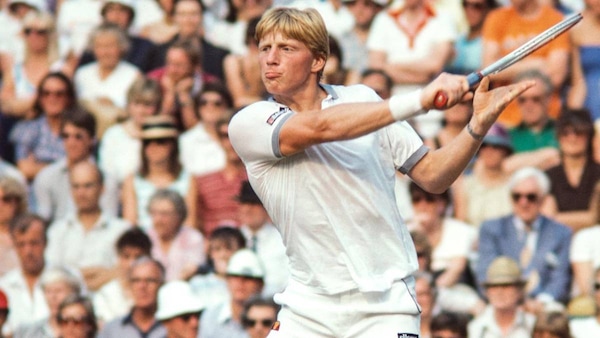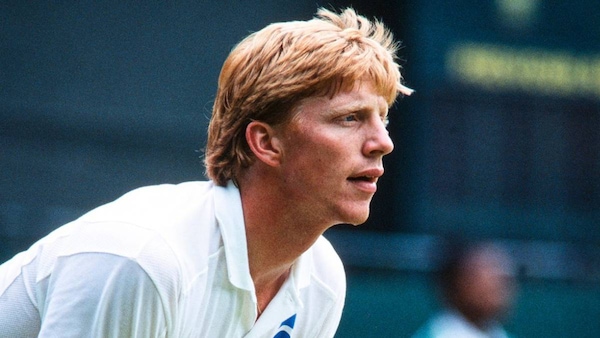Newsletter: 'Boom! Boom! The World Vs Boris Becker' Charts Tennis Ace's Topography of Trouble
This is #CineFile, where our critic Rahul Desai goes beyond the obvious takes, to dissect movies and shows that are in the news.

Last Updated: 11.41 AM, Apr 17, 2023
This column was originally published as part of our newsletter The Daily Show on April 17, 2023. Subscribe here. (We're awesome about not spamming your inbox!)
***
GIVEN Boris Becker’s notorious love for lust and lust for love, I suspected that his tennis nickname ‘Boom Boom’ — otherwise an ode to his big-serving game — would prompt the use of that (in)famous Vengaboys party song as the theme of this two-part documentary. I imagined the line “I want you in my room” scoring Becker’s diving volleys across the grass courts of Wimbledon, a place that often saw him celebrate seconds after springing up from a prostrate position. I also imagined an acoustic cover syncing the line “Let’s spend the night together” with snippets of Becker’s saucy broom-closet escapade at a Japanese restaurant in London. Yet, film-maker Alex Gibney resists this very specific cheap thrill.
His choice of theme is much classier: John Lee Hooker’s 1962 blues anthem, ‘Boom Boom’. The song plays regularly over Becker’s winning montages of his decade-and-a-half tennis career — not only making him look like a smooth player but also hinting at the “colour blindness” of his personal life. The German player was one of the rare white superstars in the 1980s and 1990s who defied norms to marry a Black woman and have an interracial family. This is perhaps also the thinking behind the use of Ennio Morricone’s Navajo Joe theme for many of Becker’s opponents — it paints the blonde champion as a Spaghetti Western hero whose relationship with power sees him serve bullets on court and dodge them off it. It’s a playful touch, as is the decision to become a mini Chef’s Table episode (the slow-motion preparation of sushi had me salivating) when Becker describes that one-night stand on the final night of his career.
The reason I’m going on about these stylistic swishes is because Boom! Boom! The World Vs Boris Becker is (in) a constant war for substance. You could call that a shortcoming, but it’s also an interesting design. You can sense a sort of cat-and-mouse game between the film-maker and his subject over two 90-minute parts titled ‘triumph’ and ‘disaster’. Becker loves to speak about his playing days and philosophise his wins and losses. He is witty, insightful and charming. The archival footage from those days is excellent, revealing him as a teenage prodigy and an unusual thinker. But he is equally slippery and roguish when it comes to his high-profile controversies.
The silver-tongued devil that he is, Becker rarely provides straight answers to questions about his financial misdoings (tax evasion in 2002, asset hiding in the 2010s), his bankruptcy and eventual prison sentencing. It’s almost impressive how confidently he skirts these issues, never once fumbling or stuttering in his whataboutery. Over two in-person interviews (in 2019 and 2022, days before his sentencing in London), an older Becker responds in that familiar commentator voice about his own life, and reveals a lot about his emotions without disclosing much about his motivations. You can see why he fell into trouble from the way he speaks, if not necessarily from what he says.

As a result, Alex Gibney becomes both documentarian and psychologist, at times breaking the fourth wall to wonder aloud why Becker is contradicting himself (in that wry Michael-Moore-ish tone) or if the master storyteller is “telling himself stories again”. The non-linear narrative — which starts in 2022 before jumping back to his 1985 Wimbledon title as a 17-year-old, then dipping in and out of the future without warning, mixing timelines and examining the 1990s through a series of great talking heads (John McEnroe and Mats Wilander are gems here) — takes some getting used to. It’s a little messy and disorienting. But there’s always a sense that Gibney is investigating Boris Becker in the anecdotal portions too, looking for hidden clues that explain the complicated tragic that he became. I like documentaries that aren’t afraid to reveal the sparring between the film and its ‘characters’. Boom! Boom! doesn’t pretend to know who Becker really is, and in that lies half the battle won. Gibney probes not the person so much as the personality, seeking answers in Becker’s torrid affair with tennis itself. His experiences in the sport tell a converging story.
For example, while charting Becker’s rise to World no. 1 in 1991, Gibney slows down this phase to make sure that we understand his observations. He shows footage of a young Becker intellectualising his own game — the 24-year-old mentions that he often goes a set or two down early in tough matches subconsciously so that he can ‘test’ himself by making a comeback. He puts himself in precarious situations to see just how far he can stretch his mind, which is to say that he knows he can win whenever he pleases. (At another point, Becker talks about tanking in a Wimbledon final because he knew that if he had won, he might have retired that very day). Gibney then remarks, like a man reviewing a film, that perhaps Becker extended this habit to his life off the court too — he didn’t mind losing a few marital and fiscal battles because he felt like he would eventually get away with the mistakes and come out stronger.

It’s a remark that shapes our reading of the second part of the documentary, one which also features Becker’s coaching stint with fellow “mental monster” Novak Djokovic. Djokovic, much like Becker, makes it sound like he would be defeated on purpose in the early parts of his career to punish himself for something he had done off the court. It’s fascinating to hear, naturally, but it certainly makes champions like Becker and Djokovic look like they’re behaving far more haunted than they actually are. Gibney doesn’t shy away from implying this, even if a lot of the subtext lies in the eye of the beholder. In the process, the viewers are left crawling to their own conclusions about Becker: Would he have won more Grand Slams if he hadn’t won that Wimbledon title at 17? Would he have been a different champion if he wasn’t German? Would he have achieved more on the court if he were a late bloomer instead?
What this treatment also does is make us empathise with the fact that delusion is invariably built into the armour of a professional athlete. From an early stage, they are trained to fool their bodies and brains into believing extraordinary things. Above that, an entire lifetime is crammed into the first 30 or 35 years of a life — they retire when most conventional careers are only just beginning. This leads to some sort of sociocultural dysmorphia, and a very distinct relationship to the changing world around them. The rise and fall of Boris Becker — as a celebrity, as a human, as a storyteller — is emblematic of this dysmorphia. His self-awareness about this comes to the fore in this oddly perceptive documentary. He explains and eludes himself at once. But the bottom line is that nothing is clear, because nothing can be. Fame is a party anthem one night, and a blues ballad the next.
